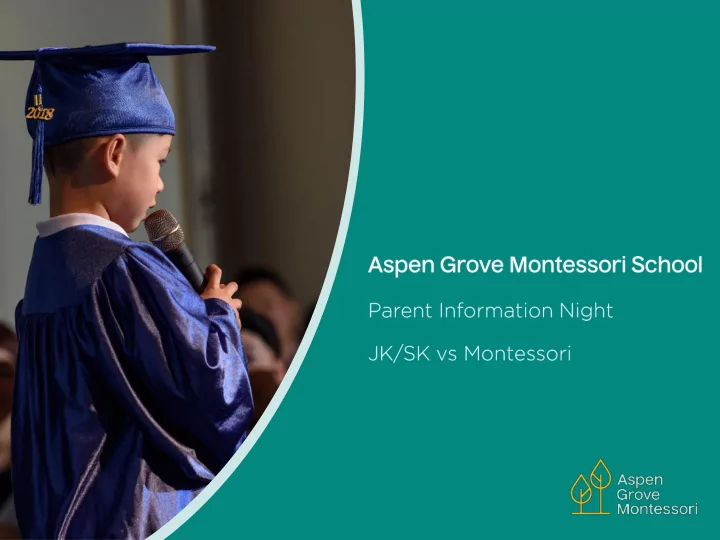

• • • • • • • •
• Children learn at their own pace and according to their own choice of activities. • Learning is a process of discovery, leading to concentration, motivation, self-discipline, and a love of learning. • Place children in 3 year age groups, the older children spontaneously share their knowledge with younger peers. • Represents an entirely different approach to education.
• A play-based program to support learning through relationships, play exploration and inquiry. • Designed to help your child develop the social, emotional, creative, cognitive and physical skills for success in school. • Provides a foundation for future learning.
Montessori Public JK/SK Lower student/teacher ratio (1:8) Higher student/teacher ratio (1:13+) Number of students per class – 24 max. Number of students per class – 26 min. Three fully trained teachers (AGMS) 1 trained teacher/1 assistant Emphasis is on the child Emphasis is on the teacher Academically based learning materials Play based materials Key component – didactic materials Key component – “loose parts” Structured environment centered around academic goals Non-structured environment centred around play Respects individual differences Emphasis on conforming to the group Classrooms organized into 5 curriculum areas: language, math, Classroom organized into areas or stations based on activities or practical life, sensorial, culture themes Individual lessons Group lessons Uninterrupted work cycles Block time, period lessons Calmer, quieter, less stressful Loud, colourful, high-stimulus Focus on grace and courtesies Grace and courtesies not applicable Teaching Assisting Concrete learning Abstract learning Huge parent involvement Huge parent responsibility Process-focused assessment, skills checklists, mastery benchmarks Product-focused report cards Goal is to foster a lifelong love of learning Goal is to master objectives
• The child is active in their own pace and rhythms; they are the “masters of their day.” • Children within a Montessori environment become highly self-regulated; a key component for traditional elementary programs. • The 3 years within the program allows the child adequate time for mastery of concepts and facts. • New skills are more easily understood and mastered in the higher grades; i.e. 1, 2, 3+ • Overall, children are far more advanced than their SK counterparts entering a grade one program.
• Building foundation – teaching children how to learn, and adapt their learning as needed. • Montessori children transition very well, as they develop a high degree of self-motivation, coping skills for dealing with new situations, and a strong sense of respect and responsibility. • Teachers in Grade 1 test the reading, comprehension and numeracy level, to assign appropriate work. (i.e. Readers)
• Reading – Montessori children learn reading phonetically, enabling them to read and expand vocabulary beyond their age. • By the end of 3 rd year Montessori learning, children will generally be reading at a high grade 2 level. • Comprehension – Montessori children will have a concrete understanding of sentence structure and grammar, versus abstract lessons from public JK/SK. Allows children to master writing and research skills. • Numeracy – Montessori children understand grade 1 math lessons effortlessly. They will then be able to internalize math lessons and build their skills beyond grade level. • These abilities will continue throughout elementary school, eventually into post secondary education.
• Uncertainty in classroom sizes and program style • Inconsistency in program plan • Lack of staff training • Lack of consistency and quality control
• French Immersion? • Elementary Montessori Schools? • Public Elementary? • Private School?
Recommend
More recommend